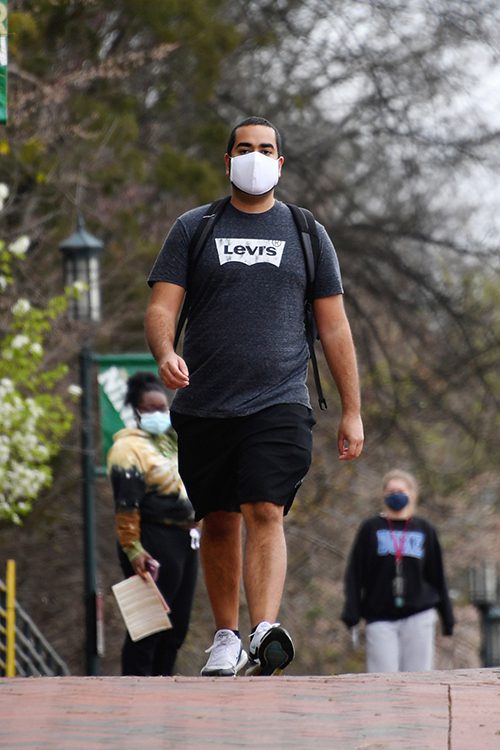Mental Health Month

In the United States, mental health services remain disproportionately inaccessible to many people of color. As May is nationally recognized as Mental Health Awareness Month, now is the perfect time to learn about mental health issues among people of color and resources available to them.
To do so, we turn to Leigh Norwood, assistant director for counseling services for UNC Charlotte’s Center for Counseling and Psychological Services (CAPS); Sonyia Richardson, assistant professor in the School of Social Work; and Roger Suclupe, clinical assistant professor in the School of Social Work.
Can you describe some of the mental health challenges people of color face?
Leigh Norwood: Recently, there has been an increased acknowledgement of the disparities that exist for people of color in relation to their mental and emotional health, and their overall access to wellness resources.
Sonyia Richardson: People of color often experience the cumulative events of racial trauma within their individual lived experiences and intergenerational trauma, which is passed down by family members. As most clinical practitioners are not trained on how to assess our racial trauma or oppression, we are often relegated to Western approaches for mental health treatment, which neglect to focus on our holistic and collective needs. As a result, the symptoms are being treated but the root of our problems are not addressed. We are being treated from an individualistic perspective that fails to account for our collective values and healing. We are not learning strategies to cope with racial trauma and oppression. Ultimately, we are taught that we need to improve our psychological well-being without learning the necessary tools for handling or responding to the ongoing oppression that is a daily reality for many of us.
Roger Suclupe: Stigma exists in all communities regarding mental health and seeking support. The extra layer that exists for Latinx communities includes access to accurate information about mental wellness in Spanish. Language barrier is another issue that contributes to the lack of seeking mental wellness support. There just are not enough Spanish-speaking providers to address the emotional and mental wellness support needed for the Latinx community.
What has been the impact of COVID-19 on mental health?

LN: While the legacies of many of these disparities are long-standing, the COVID-19 pandemic and the overwhelming persistence of race-based trauma have illuminated them even more. College students are a particularly vulnerable group given some of the transitional and developmental milestones that are at risk when factoring in variables such as social distancing, virtual learning, fears about one’s very existence and physical safety because of the identities they may hold, concerns about abuse of power, and similar factors. As a result, symptoms of anxiety, depression and other mental health concerns are on the rise.
SR: COVID-19 has exacerbated the mental health needs for various populations. There has been a rapid increase in referrals for mental health services as a result of increased anxiety, depression and suicidality. Some of the reasons for this increase are related to social isolation, loneliness, complicated grief, decreased socialization and increased stress.
RS: Some individuals in the Latinx community may have already struggled with isolation. COVID-19 exacerbated this feeling of isolation, which potentially increased depressive and anxiety symptoms.
How can we address the effects of COVID-19 on mental health going forward?
LN: One of the things we’ve been talking to students about, as they navigate this upcoming fall, is finding community, whether that’s student community, cultural community or whatever that means to [them]; making sure [they] continue to connect can mean so much in terms of how [they] manage anxiety and how [they] manage [their] mood as they navigate this upcoming fall and transition back onto campus.
SR: To address these effects going forward, we have to be willing to culturally adapt how we detect and intervene regarding mental health needs for people of color. We have to meet people where they are and exist and increase psychoeducation and outreach efforts.
RS: What we need to do now is conduct community engaged sessions or meetings to provide accurate information about the emotional and mental wellness impact COVID-19 has had on us.

by: Alexandra Pardo
Thank you to Leigh Norwood, Sonyia Richardson and Roger Suclupe for their time, expertise and contributions. Quotes have been edited for length and clarity. Photos courtesy of University Communications.